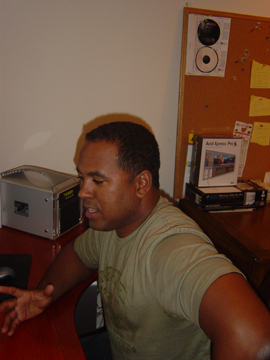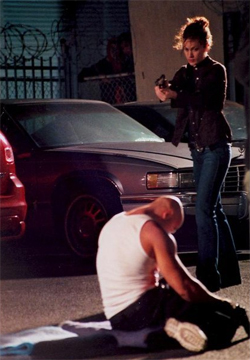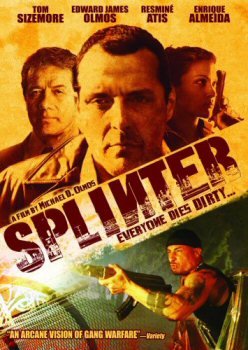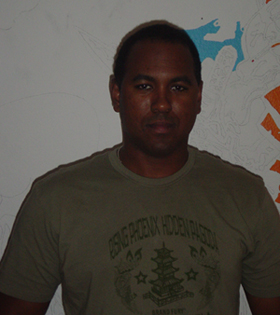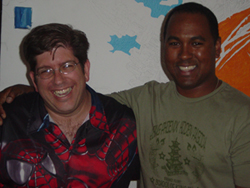|
Intense
In His Own Right
Director Michael D. Olmos talks Splinter...
|
|
|
Michael
D. Olmos at work in his studio...
|
Today,
Dark Horse Entertainment released a long-awaited project,
Splinter. Set in heart of L.A.'s gang territory, it's a
police procedural, it's a murder mystery, it's a bit of
a horror film and all around pretty tense. Plus it has an
incredibly nifty comic book like opening sequence.
And
why not? Director Michael D. Olmos (yes, son of Edward James)
has a deep love of comics, and started his company, Chamber
Six, to try and bring the graphic novel sensibility to the
big screen. After a limited L.A. release, his latest effort
should help make Dark Horse's "indie" name.
Last
summer, Olmos invited us over to his studio, Chamber
Six Productions, to talk about Splinter and other projects
in the fire. Now's the right time to get you guys hyped
about an up and coming talent able to face down both Tom
Sizemore and Commander Adama...
Derek
McCaw: How did you get involved in Splinter? One
of the stars of the movie, Enrique Almeida, is actually
the screenwriter; did he bring it to you?
Michael
D. Olmos: Yes. The original concept was his idea,
and he approached me with Noel Gugliemi, who goes by Noel
G. and plays Dusty in the (finished) film. These guys approached
me and they wanted to do a film that was sort of based on
their experiences.
Enrique
grew up among gangs in L.A., and Noel had a similar thing.
They weren’t gang members, but their friends were
all guys in the lifestyle and trying to get out. They wanted
to do a small film. We read it. We really liked it, but
it was a straightforward revenge story, really low-budget.
We added
some bigger elements and experiment with the genre, make
it more like a graphic novel.
Derek
McCaw: So you added the police side of the story?
Michael
D. Olmos: Yeah.
|
|
|
Resmine
Atis takes down a perp...
|
Derek
McCaw: And there’s something not quite…it’s
not a superhero…I want to say just supernatural going
on with the lead cop, played by Resmine Atis, who is your
wife?
Michael
D. Olmos: That’s my wife. We got married
after the film. We were going out for two years before we
did the movie, and it’s her third independent film.
Derek
McCaw: You introduced this element to make it a
little more comic book-y.
Michael
D. Olmos: It was a weird balance with this film.
We wanted to introduce those elements but not go all the
way out with them. We wanted her to be sort of a psychic,
but also more just in tune with the crime scenes so she
can size something up. She’s a little deeper than
that, and can transition into the crime.
We added
that element, and I think it works pretty well. We got a
nice balance with that. Other elements, we wanted it to
be like a Western. So we added a lot of elements in there
like, did you get to the Sergio Leone scene?
Derek
McCaw: Yes.
Michael
D. Olmos: When you watch the film, you see it is
like a modern-day Western.
Derek
McCaw: I know exactly which scene you’re
talking about, and I’d just seen some Leone so I went,
ah, yes, I know where that’s coming from.
Michael
D. Olmos: The interesting story about the film
is that when Enrique came to us, we said we’d make
the movie, but where are we going to get the funding? You
know you can’t make films without money.
Derek
McCaw: I say HA.
Michael
D. Olmos: You can try, but you know…he said,
“my mom really believes in this project, and she’s
going to mortgage her house and put up the money to make
it.”
Derek
McCaw: Tell me she has been paid back.
Michael
D. Olmos: Mike Richardson at Dark Horse has assured
me that she’s going to get that back. They’re
really cool guys; they’ve put her in first position
to recoup, which you never hear from a distributor.
Derek
McCaw: He’s good people.
Michael
D. Olmos: Oh, yeah, Mike’s a great person.
When he heard that, he turned red and said “are you
kidding me? We’ve got to make sure she’s paid
back.”
It was
a big risk, but Enrique said, “she wants to do this,
she believes in me.” It’s hard for us to break
into Hollywood, it’s hard for us to break into movies
without playing the stereotypical gangster. If we’re
going to do that, we’re going to do it on our terms
and to commercialize off it ourselves.
Derek
McCaw: How did Dark Horse get involved?
You’d already started filming when they swooped in.
Michael
D. Olmos: We started budgeting the film, and working
with the screenplay. The screenplay got to the point where
it started looking attractive to name actors. The story
really had gelled. I gave it to my dad, and said here’s
this little horror movie, I don’t think it’s
up your alley.
He said,
“this is really good.” He really liked what
we were doing and he came on board. Which meant we had to
go SAG. Then my dad said we should get a DGA person, and
I should join the DGA. So I did, we got a great first A.D.
But
all these things, once you go union, it shoots up the budget.
Enrique, through a friend of his, got an introduction to
Barry Levine and Mike. Barry was over at Dark Horse, we
met with Mike, we said we had half the budget and we have
these guys attached.
At the
time, my dad was attached, but then Battlestar
picked up. He had to go off and shoot, but he said he’d
be attached to play the Captain, so we got Tom Sizemore.
We had Tom, my dad, half the budget and Mike read the screenplay,
really liked it and jumped on board. The rest is history.
Derek
McCaw: Here’s the question you’ll have
to answer a thousand times. Intimidated directing your dad,
one of the most intense actors in modern film?
Michael
D. Olmos: Of course.
|
|
|
Practicing
staring down his dad...
|
Derek
McCaw: Did he ever just look at you and hiss, “I
changed your diapers?”
Michael
D. Olmos: Yes.(laughs) No, I think the
nervousness was just my own thing. Because I didn’t
want to not provide the environment in which he could work
as a professional; I wanted to deliver the goods as a director.
Derek
McCaw: How much time did you have with him?
Michael
D. Olmos: Actually, I only had two days with him.
It was a short period of time. But when he came to the set…my
dad’s like any good creative person, he approaches
the story for story’s sake. He comes in with this
creative vibe, what’s this scene about, can we shoot
it this way? What do you think?
We started
collaborating. When we got Tom on the set they both just
jumped in, it became like jazz. It worked. It was amazing.
Derek
McCaw: I think the police precinct scenes are really
strong. One thing that I found interesting watching was
that the gang-banger stuff was so matter of fact. Here I
am, white boy from Northern California, not having experienced
any of this. Was that on purpose, that even the talk of
violence just seemed so casual…it was really disturbing.
Michael
D. Olmos: Yes. That was the intent. The gang stuff…they’re
gangsters last. They’re just like you guys, they’ll
sit around talking about movies, then somebody will start
saying “did you hear about so and so, two days ago
he got shot...he was standing outside, he wasn’t a
gangbanger, but these guys rolled up and everyone ran and
kind of froze. He got hit five times and died right over
there.”
They
start talking about these instances that are really horrific,
but they’re matter of fact. This happened. They’re
great people, great guys, and they are dealt a bad card,
growing up in these neighborhoods. You’re just in
the situation, and things just happen.
That’s
what I wanted to convey. These are just people in a bad
situation.
Derek
McCaw: This brings up a tough point. A lot of these
actors playing the gangbangers are gangbangers, and they’re
hoping this is a way out. How realistic do you really think
that is?
Michael
D. Olmos: To different degrees. Emilio Rivera,
who plays Jesse, the leader, he’s been in tons of
films. He’s been in Collateral, just look at his imdb.
He’s always got a small part, but he’s always
got a huge screen presence. I saw him in this independent
film where he plays an AA counselor. He’s phenomenal.
He’s not playing a gang member, he’s just a
hard tough as nails street guy.
He was
a hardcore gangbanger. In a documentary, he’s told
what happened. He was in a bad place, he was gangbanging,
he was on PCP, he shot at people…what made him realize
he needed a change was he was on PCP in a fight with his
wife, and he stabbed her. That made him snap. She didn’t
leave him.
He moved
away from the neighborhood, and changed his life. He was
really young when all this happened. He’s in his late
forties now, but he makes his living now as a professional
actor. He’s always working.
These
younger guys, they’re making this transition, but
they’re playing gang members in the film. Can they
transition as actors and learn the craft? Can they go past
playing the gangbanger? Enrique has made a living just playing
the same character, but the other guys, I don’t know.
I guess
it’s just a question of how dedicated they become.
Definitely the doors are opening. There aren’t a lot
of opportunities, though, but they email me and say thank
you so much, you gave us hope.
|
|
|
Begging
to be in the ensemble...
|
Derek
McCaw: Your next project you have would still fit
in there. You could have a little ensemble.
Michael
D. Olmos: It’s called Luchadores 5.
We had a script meeting with Pierre Spengler, one of the
producers of the (Richard Donner) Superman movie. It’s
a comic book. It’s had a limited published run, sort
of a small press thing, I guess.
But
it’s amazing. It’s about five guys in East L.A.
who are superheroes. They’re like these underdog superheroes
who don Mexican wrestling masks and save the neighborhood.
Basically, they’re ridiculed by the whole community,
the neighbors, by everyone around them until they rise to
the occasion and save the day.
It’s
an action comedy. I don’t think there’s anything
quite like it, so I can’t really compare it to anything.
But it’s a comedy, it’s a farce and it’s
in L.A. where the gangbangers are like Tiki Warriors and
werewolves. It’s interesting because we’re trying
to balance out the things you can get away with in a comic
book with what you can do in a movie. We’re trying
to tone it down for a movie reality.
Yeah,
it’s a departure from Splinter, but I could
still use those guys. For instance, there’s these
two video clerks that ridicule one of the luchadores because
he’s always wearing his mask, going, “hey, Batman,
you just sit outside the video store.”
Just
today in a meeting I said I wanted to make those guys cholos.
Because it’s a nice twist.
Derek
McCaw: How much responsibility do you have toward
these guys? You're giving them hope. Your dad has been in
some of the seminal films of Hispanic-American culture,
Zoot Suit, American Me…
Michael
D. Olmos: Stand and Deliver, Selena…yeah.
The responsibility I feel is not that I have to change people’s
lives. But I can create product that can employ people.
I can employ some of these guys. Even if they want to direct,
if I can at least mentor and let them sit in on the process
of filmmaking, that’s great.
|
